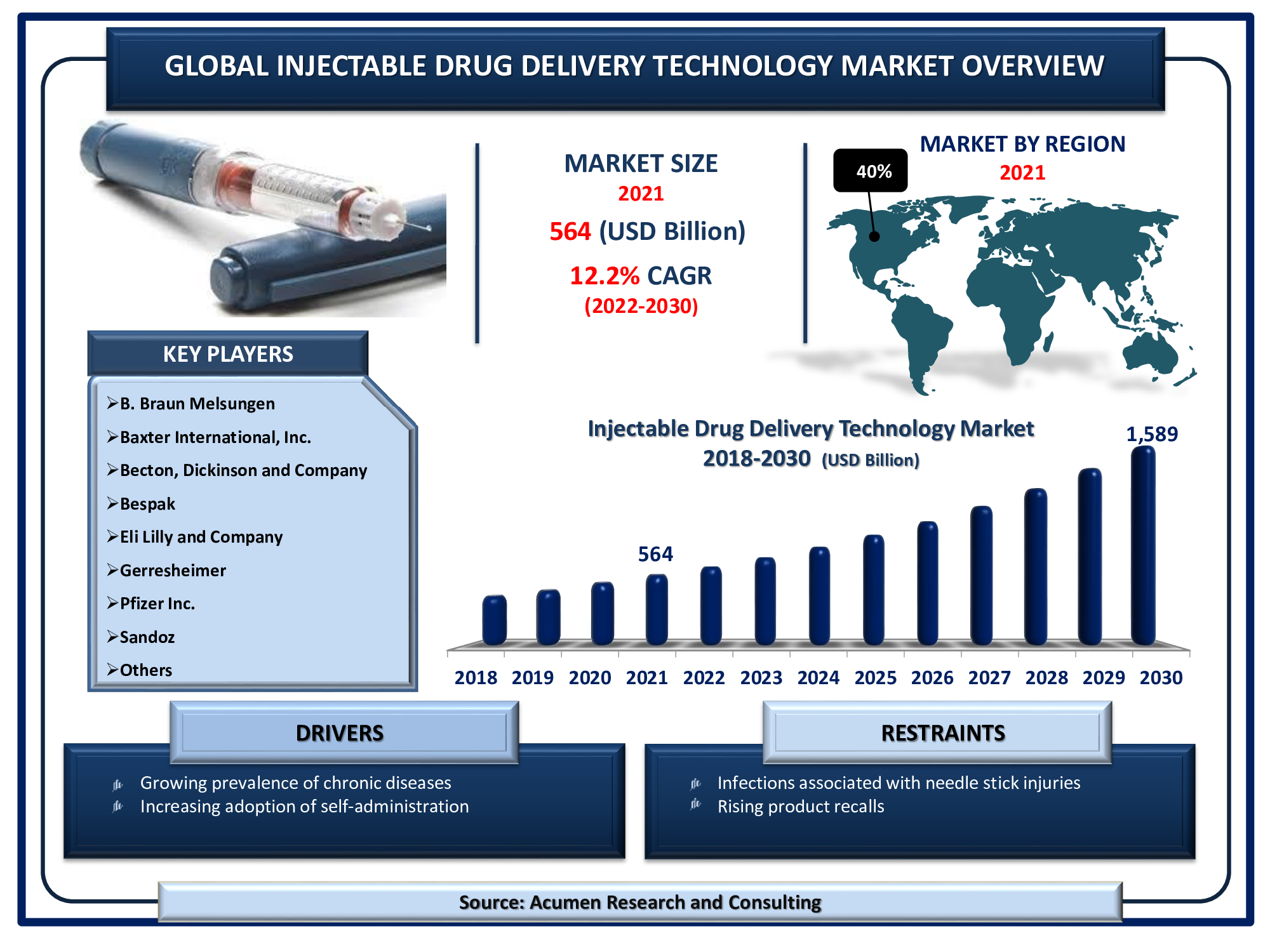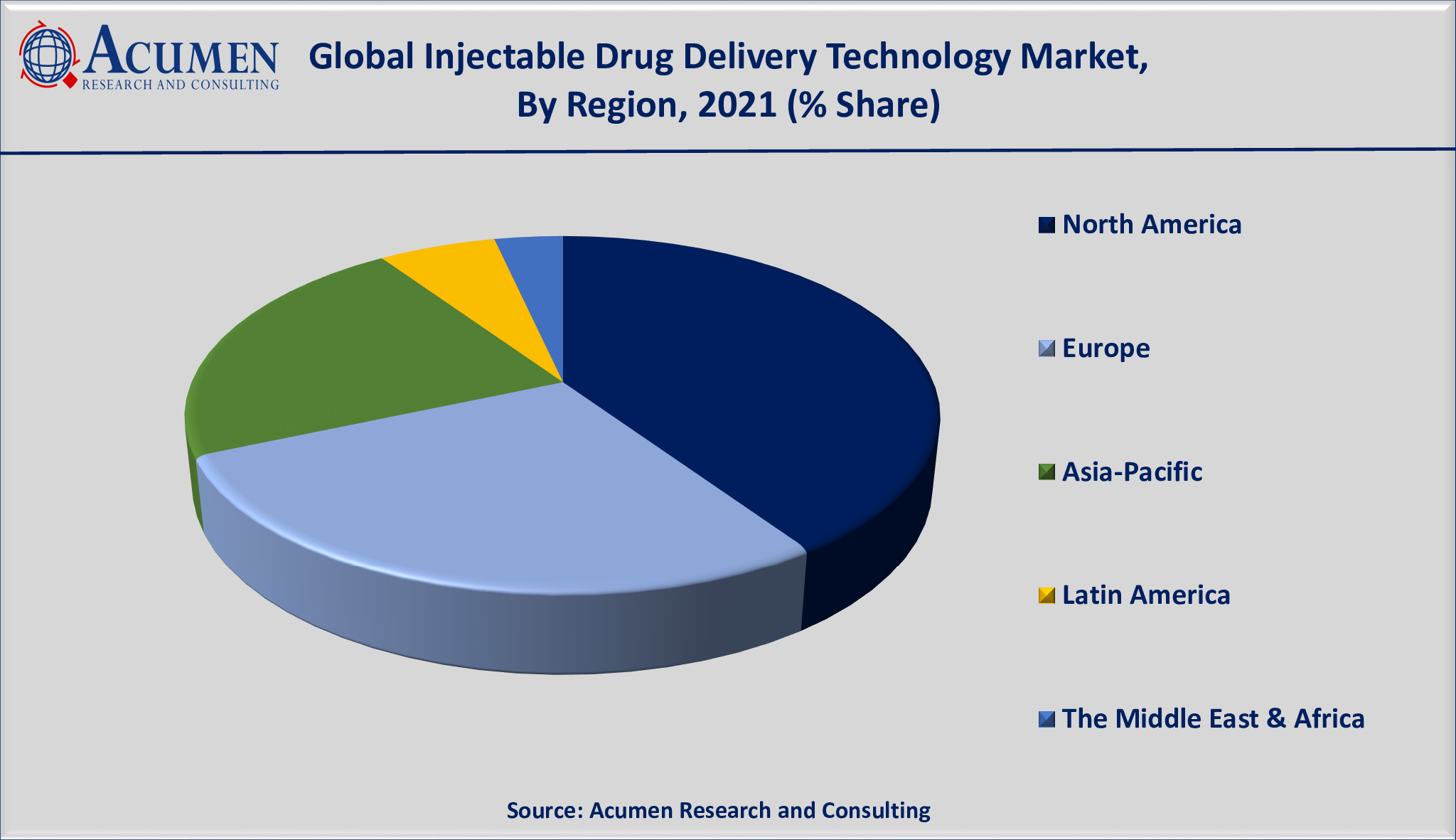Injectable Drug Delivery Technology Market Size - Global Industry Share, Analysis, Trends and Forecast 2022 - 2030
Published :
Report ID:
Pages :
Format :
Injectable Drug Delivery Technology Market Size - Global Industry Share, Analysis, Trends and Forecast 2022 - 2030
Report Coverage
- Industry Dynamics
- Market Size and Forecast Data
- Segment Analysis
- Competitive Landscape
- Regional Analysis with a Niche Focus on Country-Level Data
- High Level Analysis - Porter's, PESTEL, Value Chain, etc.
- Company Profiles of Key Players
- Option to Customize the Report As Per Your Specific Need
Request Sample Report
The Global Injectable Drug Delivery Technology Market Size is valued at USD 564 Billion in 2021 and is estimated to achieve a market size of USD 1,589 Billion by 2030; growing at a CAGR of 12.2%.

Injection devices deliver the latest generation of drugs directly to the blood stream or to the specific tissues. During last few years there is a significant increase in the demand for the various injectable products as they offer a wide array of benefits such as safety, efficacy, and improve the stability. During last few years, there is a significant development in the injectable drug delivery technology. The increasing adoption of self-administration is one of the recent trends in the global injectable drug delivery technology market. According to our injectable drug delivery technology industry analysis, the growing research & development by key players and research institutes to launch innovative products is also fueling the market demand.
Global Injectable Drug Delivery Technology Market DRO’s:
Market Drivers:
- Growing prevalence of chronic diseases
- Increasing adoption of self-administration
- Growth in biologics industry
Market Restraints:
- Infections associated with needle stick injuries
- Rising product recalls
Market Opportunities:
- Growing adoption of biosimilars and genetic injectable
- Continuous R&D to launch innovative products
Injectable Drug Delivery Technology Market Report Coverage:
| Market | Injectable Drug Delivery Technology Market |
| Injectable Drug Delivery Technology Market Size 2021 | USD 564 Baillion |
| Injectable Drug Delivery Technology Market Forecast 2030 | USD 1,589 Billion |
| Injectable Drug Delivery Technology Market CAGR During 2022 - 2030 | 12.2% |
| Injectable Drug Delivery Technology Market Analysis Period | 2018 - 2030 |
| Injectable Drug Delivery Technology Market Base Year | 2021 |
| Injectable Drug Delivery Technology Market Forecast Data | 2022 - 2030 |
| Segments Covered | By Formulation, By Device Type, By Mode Of Delivery, By Application, And By Region |
| Injectable Drug Delivery Technology Market Regional Scope | North America, Europe, Asia Pacific, Latin America, and Middle East & Africa |
| Key Companies Profiled | B. Braun Melsungen, Baxter International, Inc., Becton, Dickinson and Company, Bespak, Eli Lilly and Company, Gerresheimer, Pfizer Inc., Sandoz, Schott AG, Terumo, Teva Pharmaceuticals Industries Ltd., and Ypsomed AG. |
| Report Coverage |
Market Trends, Drivers, Restraints, Competitive Analysis, Player Profiling, Regulation Analysis |
The global injectable drug delivery technology market is majorly driven by rising prevalence of various chronic diseases like cancer, diabetes, immunological disease and others. Increasing demand for the better and convenient route of administration for the medication and increasing government support will fueled the growth of the market. According to the World Health Organization (WHO), in 2014, approximately 422 million people across the globe were suffering from diabetes. Moreover, rising per capita income, rising awareness among the people, and increased the demand for the better treatment have boosted the growth of the market during the forecast period 2022 - 2030. On the other hand, risk of infection associated to the injection may slow the growth of the market.
While the potency and efficacy of the drug substance remain critical, changing patient needs and expectations are driving the need to improve the patient-friendliness of every product attribute-in ways that support not only product efficacy, but also the safety, compliance, convenience, and market differentiation of new injectable products. In response to major concurrent trends in the global biopharma market, a new generation of premium injectable products is already taking shape. These products not only provide safe, effective long-term treatment, but they also establish new guidelines for accurate, safe, and convenient self-administration. These advanced injectable will present their owners with both new opportunities and new challenges.
Injectable Drug Delivery Technology Market Segmentation
The market can be bifurcated on the basis of formulation, device type, mode of delivery, application, and region.
Injectable Drug Delivery Technology Market by Formulation
- Nanoparticles
- Liposomes
- Microspheres
- Others
Injectable Drug Delivery Technology Market by Device Type
- Needle Free Injectors
- Reusable Needles
- Pre-Filled Syringes
- Auto Injectors
- Pen Needle
- Disposable Syringes
- Others
Injectable Drug Delivery Technology Market by Mode of Delivery
- Intraperitoneal
- Intravenous
- Intramuscular
- Subcutaneous
- Others
Injectable Drug Delivery Technology Market by Application
- Oncology
- Orphan Diseases
- Auto-Immune Disease
- Others
Injectable Drug Delivery Technology Market Regional Outlook
North America
- U.S.
- Canada
Europe
- U.K.
- Germany
- France
- Spain
- Rest of Europe
Latin America
- Mexico
- Brazil
- Rest of Latin America
Asia-Pacific
- India
- Japan
- China
- Australia
- South Korea
- Rest of Asia-Pacific
The Middle East & Africa (MEA)
- Gulf Cooperation Council (GCC)
- South Africa
- Rest of the Middle East & Africa

Rising healthcare spending in US and Canada fuels the North America injectable drug delivery technology market value
North America is expected to hold the major share in the global injectable drug delivery technology market owing increasing prevalence of various types of the medications, rising healthcare spending and increasing prevalence of the various chronic diseases in this region. Additionally, huge government support and presence of well developed economies has fuelled the growth of the market.
Europe accounts for the second leading position in the market followed by Asia Pacific. The major driving factors for the growth of the Europe market are increasing government support, presence of huge patient pool and high healthcare spending. Asia Pacific is the fastest growing region for the injectable drug delivery technology market during the forecast period 2022-2030 owing to presence of rapidly developing economies, increasing spending on research and development and increasing government support. On the other hand, LAMEA is expected to witness the steady growth in near future. The Middle East is expected to hold the major share for the market owing to the well developed healthcare sector and high spending on research and development.
Injectable Drug Delivery Technology Market Players
Some of the global injectable drug delivery technology companies profiled in the report include B. Braun Melsungen, Baxter International, Inc., Becton, Dickinson and Company, Bespak, Eli Lilly and Company, Gerresheimer, Pfizer Inc., Sandoz, Schott AG, Terumo, Teva Pharmaceuticals Industries Ltd., and Ypsomed AG.
On March 2020 – Becton, Dickinson and Company has announced the completion of their 50 human clinical trials for their investigational device, the BD Libertas Wearable Injector.
Similarly on October 2019, Becton, Dickinson and Company (BD) announced the launch of a BD Intevia a new 2-step disposable auto injector platform device that combines a pre-filled and auto injector syringe in a single integrated system.
Frequently Asked Questions
How much was the size of the global injectable drug delivery technology market in 2021?
The global injectable drug delivery technology market size in 2021 was accounted to be USD 564 Billion.
What will be the projected CAGR for global injectable drug delivery technology market during forecast period of 2022 to 2030?
The projected CAGR injectable drug delivery technology market during the analysis period of 2022 to 2030 is 12.2%.
Which are the prominent competitors operating in the market?
The prominent players of the global injectable drug delivery technology market are B. Braun Melsungen, Baxter International, Inc., Becton, Dickinson and Company, Bespak, Eli Lilly and Company, Gerresheimer, Pfizer Inc., Sandoz, Schott AG, Terumo, Teva Pharmaceuticals Industries Ltd., and Ypsomed AG.
Which region held the dominating position in the global injectable drug delivery technology market?
North America held the dominating injectable drug delivery technology during the analysis period of 2022 to 2030.
Which region exhibited the fastest growing CAGR for the forecast period of 2022 to 2030?
Asia-Pacific region exhibited fastest growing CAGR for injectable drug delivery technology during the analysis period of 2022 to 2030.
What are the current trends and dynamics in the global injectable drug delivery technology market?
Growing prevalence of chronic diseases, increasing adoption of self-administration, and growth in biologics industry drives the growth of global injectable drug delivery technology market.
By Formulation segment, which sub-segment held the maximum share?
Based on Formulation, Nanoparticles segment held the maximum share injectable drug delivery technology market in 2021.


